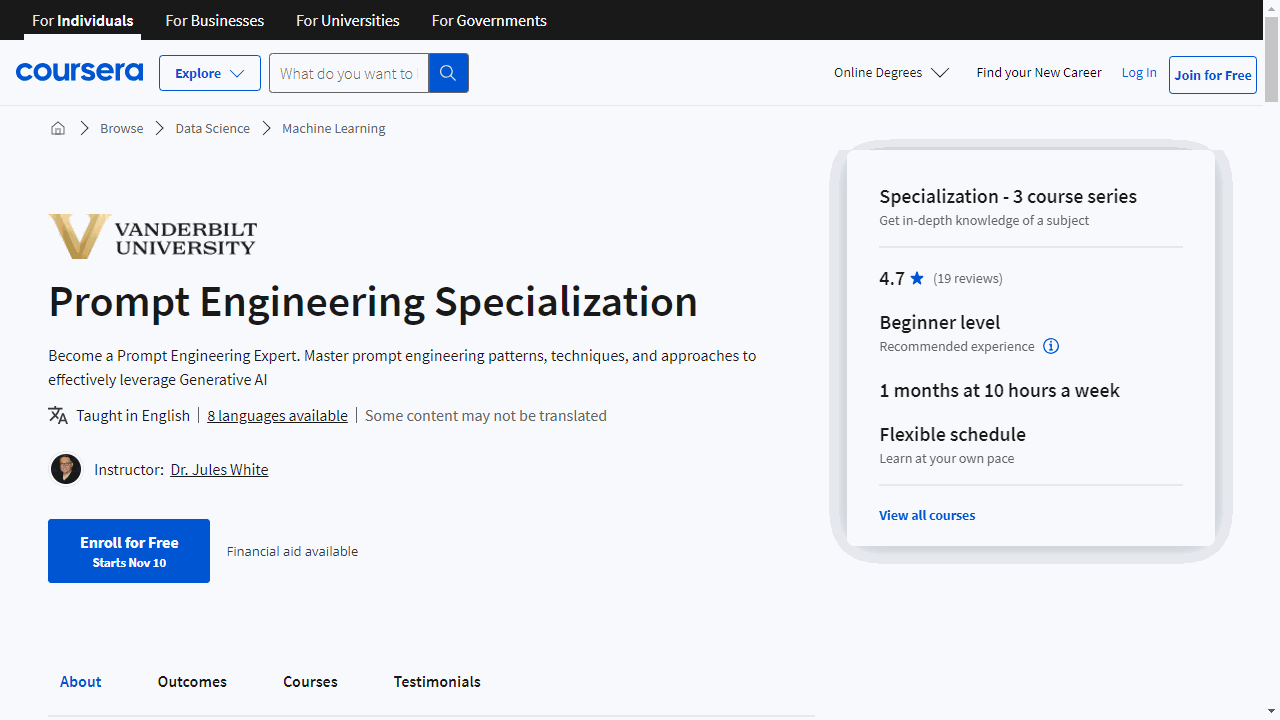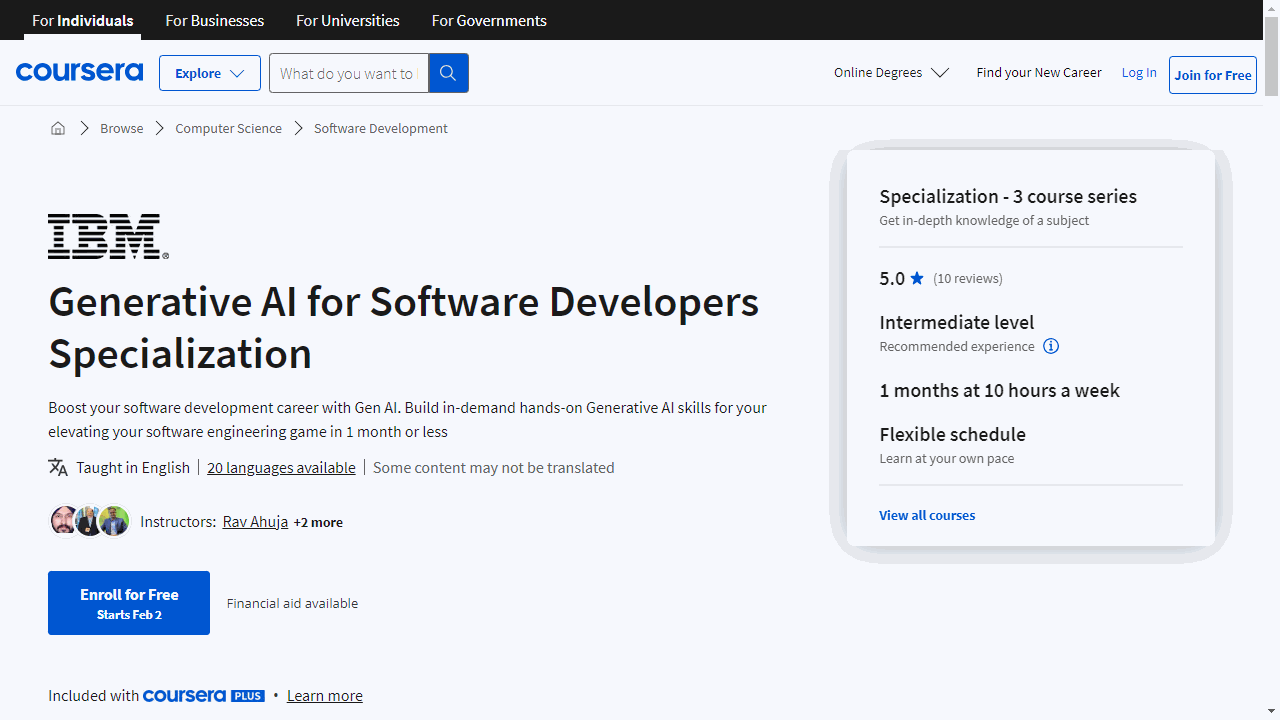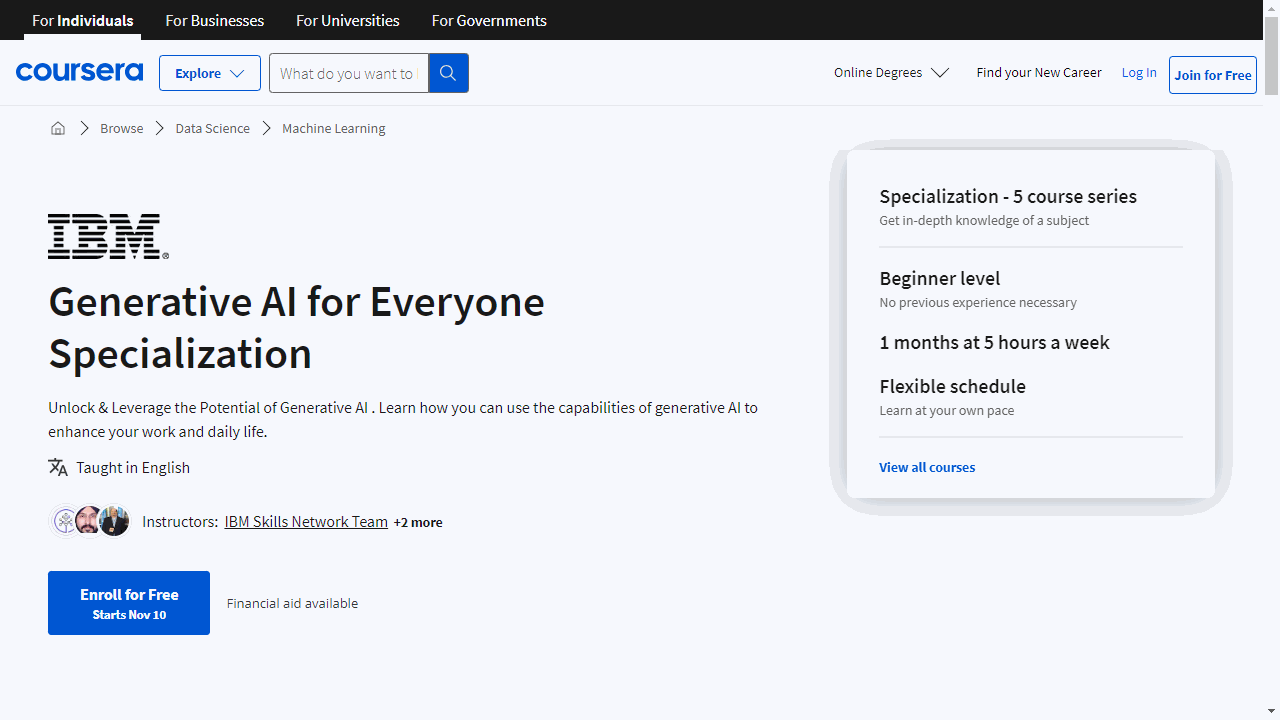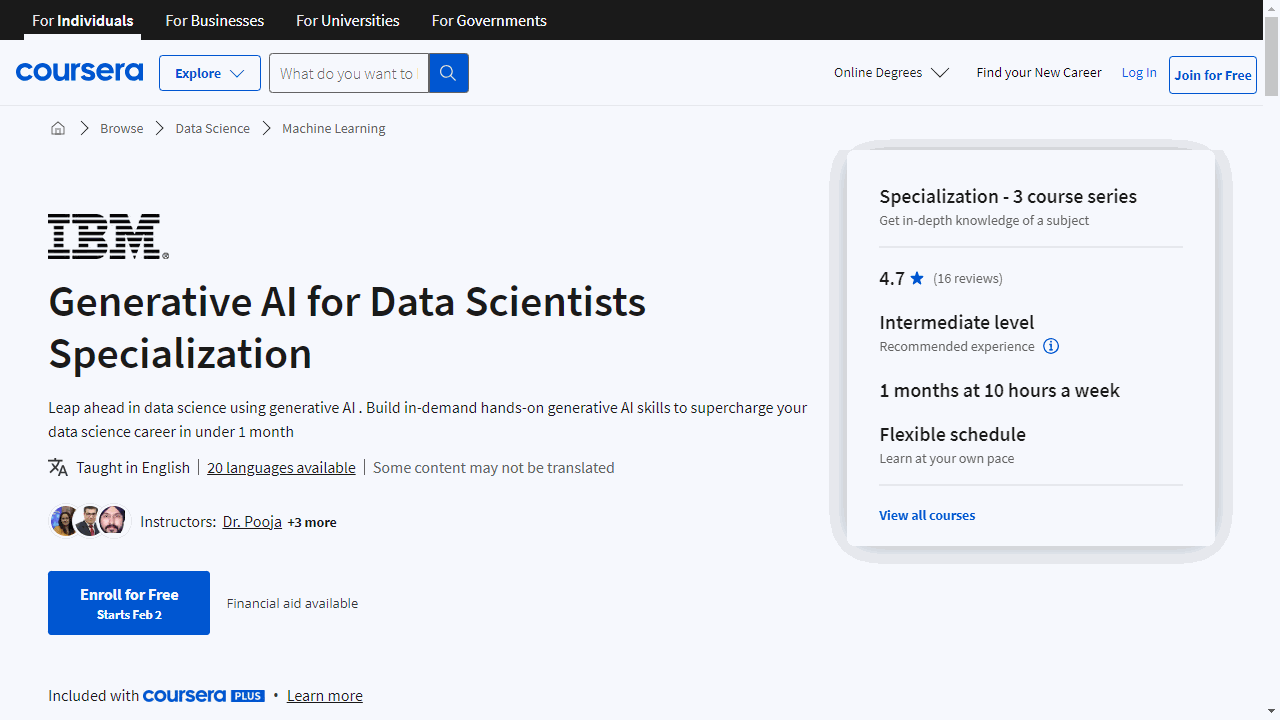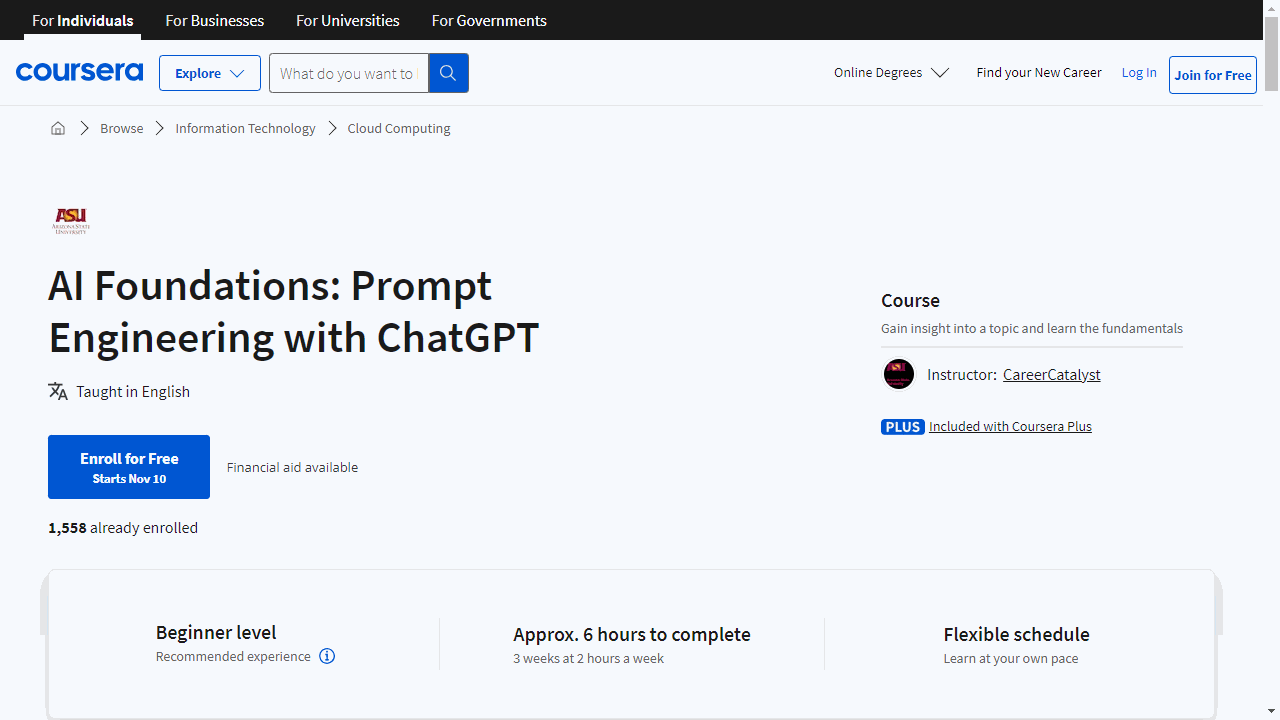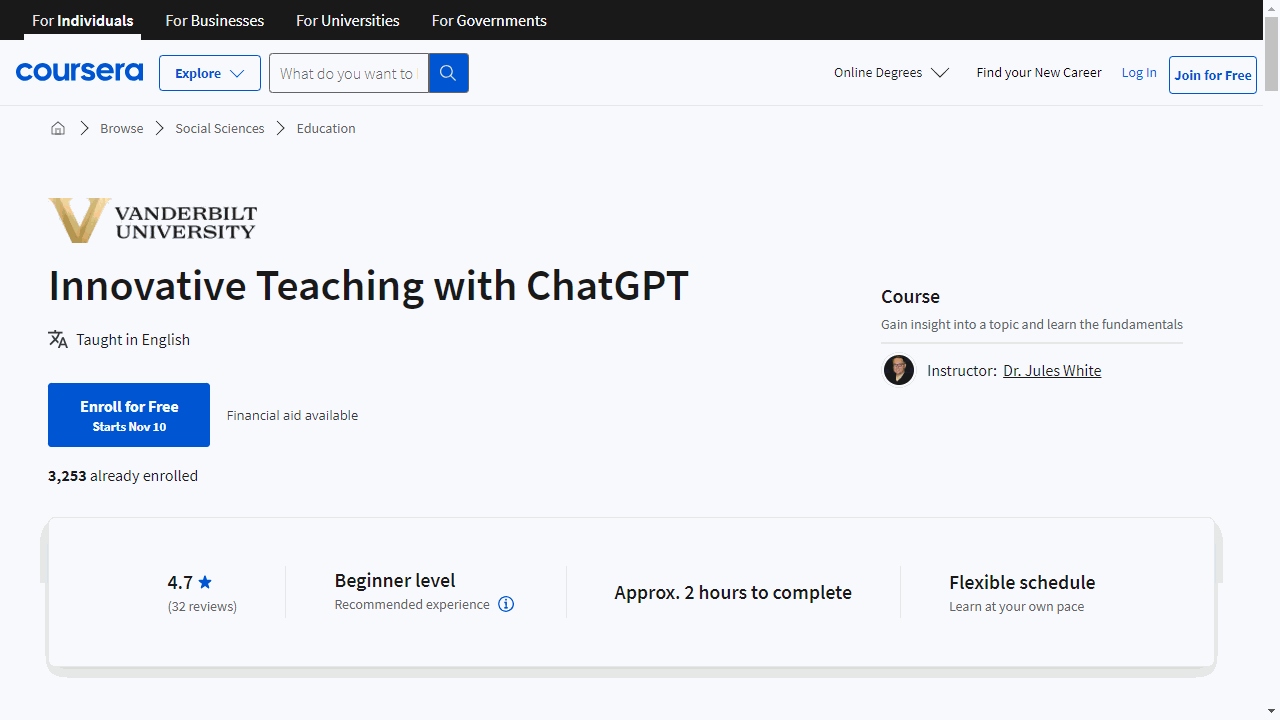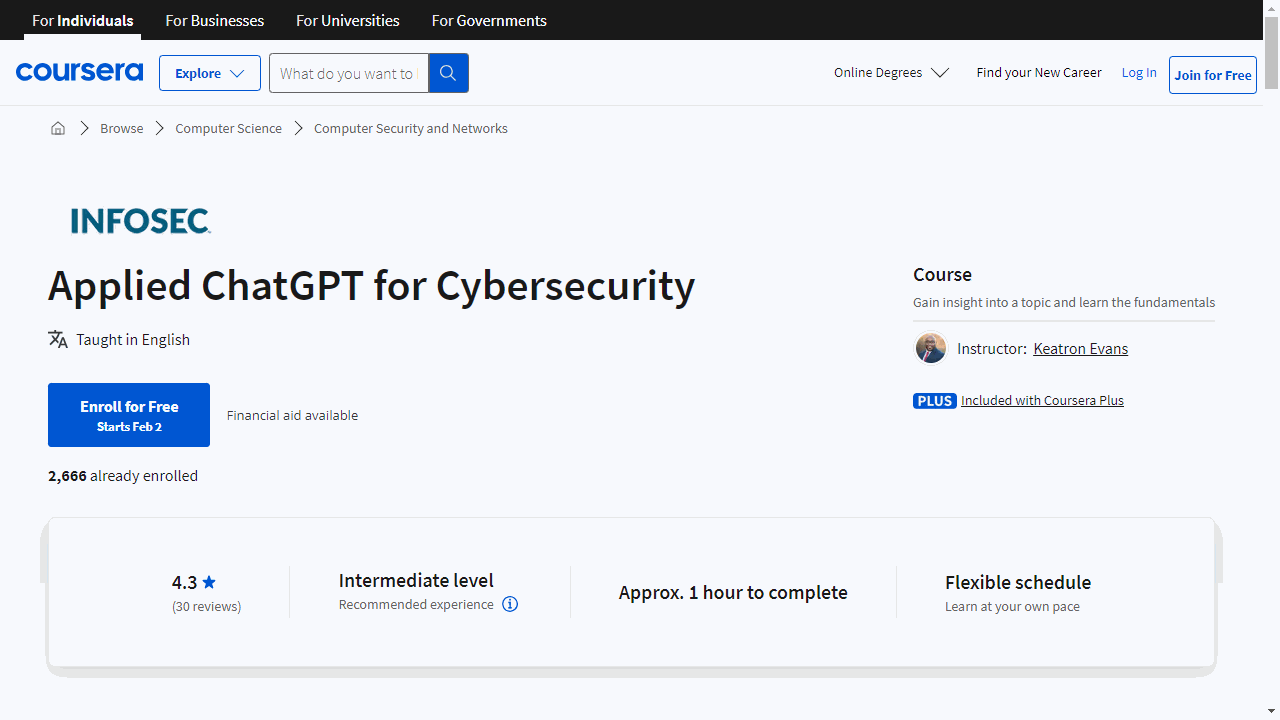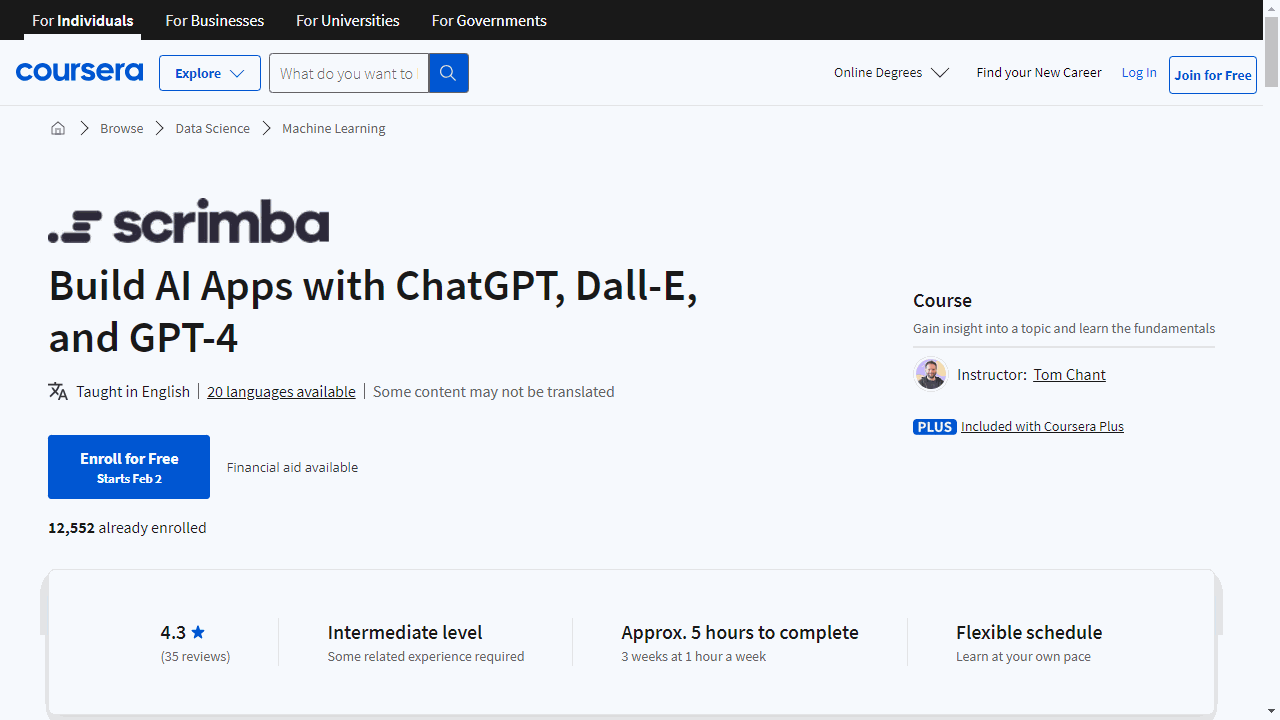Prompt engineering is an essential skill in the age of generative AI, allowing you to effectively communicate with powerful tools like ChatGPT and unlock their full potential.
By learning prompt engineering, you can enhance your productivity across various tasks, from writing and summarization to complex problem-solving and data analysis.
Finding the right prompt engineering course can feel overwhelming, especially with so many options available online.
You want a program that’s both comprehensive and engaging, taught by experts and tailored to your learning style.
We’ve explored the best prompt engineering courses on Coursera and have identified Prompt Engineering Specialization by Vanderbilt University as the best option overall.
This comprehensive specialization combines theoretical knowledge with hands-on practice, covering essential skills like crafting effective prompts, understanding different AI models, and navigating the ethical considerations of generative AI.
While this is our top pick, there are other excellent courses available that may suit your specific needs and goals.
Keep reading for a detailed overview of the best prompt engineering courses on Coursera, including options for beginners, intermediate learners, and experts.
Prompt Engineering Specialization
This series of courses, offered by Vanderbilt University, is designed to equip you with the skills to harness the power of tools like ChatGPT (OpenAI) effectively.
The course “Prompt Engineering for ChatGPT” is a comprehensive introduction to becoming a proficient user of generative AI.
You’ll learn to craft prompts that tap into the AI’s capabilities, enabling you to tackle a wide array of tasks more efficiently, from writing and summarization to complex problem-solving.
Moving on, “ChatGPT Advanced Data Analysis” is a practical course that teaches you to leverage AI for data science tasks without needing a background in programming.
You’ll discover how to transform raw data into compelling presentations, extract valuable insights from documents, and even automate routine content creation.
This course is about enhancing your ability to handle data with the help of AI, making your workflow more efficient.
Lastly, “Trustworthy Generative AI” addresses the critical aspect of reliability in AI outputs.
This course provides strategies for selecting suitable problems for AI, designing prompts that minimize risks, and verifying the information generated.
It’s about building a foundation of trust in the AI’s capabilities and integrating it into your creative and analytical processes.
The focus is on practical application, ensuring that what you learn will have real-world benefits.
Generative AI for Software Developers Specialization
Provider: IBM
This series equips you with the skills to harness generative AI in software development, focusing on the art of prompt engineering.
The journey begins with “Generative AI: Introduction and Applications,” setting the foundation.
This course demystifies generative AI, covering its evolution and showcasing its impact across various domains like text, image, and audio.
You’ll get acquainted with AI models such as GPT and DALL-E, understanding their applications in diverse sectors.
Next, “Generative AI: Prompt Engineering Basics” dives deep into prompt engineering.
Here, you learn to steer AI tools like ChatGPT to achieve specific outcomes.
The course covers essential techniques and approaches, including zero-shot, few-shot, Interview Pattern, and Chain-of-Thought.
Practical labs with tools like IBM watsonx Prompt Lab let you practice crafting effective prompts, making you proficient in guiding AI responses.
Finally, “Generative AI: Elevate your Software Development Career” specifically targets software developers, showing how generative AI can revolutionize coding practices.
From generating code snippets to optimizing programs, this course offers hands-on experience in applying AI for software development tasks.
It introduces tools like GitHub CoPilot and IBM watsonx Code Assistant, preparing you to integrate AI into your development workflow effectively.
Throughout these courses, hands-on labs, expert insights, and practical projects ensure you apply your learning.
Generative AI for Everyone Specialization
Provider: IBM
The journey begins with “Generative AI: Introduction and Applications,” a course that is designed not just for tech experts but for anyone with an interest in AI.
You’ll delve into the evolution of generative AI, understand its impact across various domains, and get hands-on experience with leading AI models.
After finishing, you’ll be able to articulate the nuances of generative AI and its practical applications in the real world.
Moving on to “Generative AI: Prompt Engineering Basics,” this course demystifies the process of guiding AI to produce specific outcomes.
It’s about precision – learning to craft prompts that lead to high-quality results.
You’ll explore different techniques and gain insights into the best practices for prompt engineering.
The course equips you with the skills to effectively communicate with AI models to get the results you want.
In “Generative AI: Foundation Models and Platforms,” you’ll dive deeper into the core models that power generative AI.
This course provides a clear understanding of the technologies that underpin AI applications.
You’ll also get acquainted with various AI platforms, enhancing your ability to leverage these tools for innovative solutions.
Ethical considerations are paramount in AI, and “Generative AI: Ethical Issues, Considerations & Implications” addresses this head-on.
You’ll engage with the ethical dilemmas AI presents, from data privacy to bias.
This course encourages a thoughtful approach to AI development, ensuring you’re prepared to address and mitigate potential risks.
Lastly, “Generative AI: Future and Professional Growth” offers a forward-looking perspective.
It’s about envisioning the trajectory of generative AI and identifying how it can bolster your career.
You’ll explore emerging job roles and learn how to apply AI to enhance workplace efficiency.
Generative AI for Data Scientists Specialization
Provider: IBM
This series targets a broad audience, including professionals and enthusiasts keen on exploring generative AI and its applications in prompt engineering.
Starting with “Generative AI: Introduction and Applications,” you gain a solid foundation in generative AI’s basics, exploring its evolution and application across various fields such as text, image, and audio.
This course demystifies the technology behind tools like GPT and DALL-E, showcasing their industry applications.
Engaging hands-on labs and insights from experts enhance your learning experience, preparing you for more specialized topics.
The specialization then narrows down to “Generative AI: Prompt Engineering Basics,” a course that’s a treasure trove for those eager to master prompt engineering.
Here, you learn to craft prompts that precisely guide AI models to desired outcomes.
Techniques like zero-shot and few-shot, along with approaches such as Interview Pattern and Chain-of-Thought, are covered in detail.
Practical labs and access to tools like IBM watsonx Prompt Lab ensure you can practice and refine your skills in creating effective prompts, making this course essential for unlocking generative AI tools like ChatGPT’s full potential.
Completing the specialization, “Generative AI: Elevate Your Data Science Career” targets data scientists aiming to integrate generative AI into their workflow.
This course addresses real-world challenges in data generation, augmentation, and feature engineering, offering practical skills in using generative AI for data visualization, model building, and insights generation.
Ethical considerations of generative AI in data science are also discussed, rounding off your learning with a hands-on project that applies directly to professional scenarios.
AI Foundations: Prompt Engineering with ChatGPT
The journey begins with an orientation by Andrew Maynard, who sets the stage for what you’ll learn. This isn’t just a cursory overview; it’s a detailed roadmap to help you navigate the course with confidence.
You’ll then delve into the core principles of ChatGPT, framed by the RACCCA Framework.
This acronym stands for Relevance, Accuracy, Completeness, Clarity, Coherence, and Appropriateness, and it’s a systematic approach to crafting prompts that yield meaningful AI responses.
As you progress to Module 2, the course shifts from theory to application.
Here, you’ll start to see the power of your new skills in action. You’ll practice creating prompts that leverage ChatGPT’s capabilities, gaining valuable experience that goes beyond textbook learning.
The course also introduces Prompt Templates, a practical tool that streamlines your interactions with AI.
These templates are not just time-savers; they’re a way to achieve consistency and precision in your prompts, much like following a well-tested recipe ensures a great meal.
In the section on Imaginative Prompt Engineering, creativity takes center stage.
This part of the course empowers you to ask innovative questions and push the boundaries of what you thought possible with AI.
It’s an opportunity to blend your unique ideas with the technical prowess of ChatGPT.
Innovative Teaching with ChatGPT
This course is positioned at the intersection of AI and education, offering practical strategies for teachers eager to integrate technology into their classrooms.
The course begins with a comprehensive overview of how AI, specifically ChatGPT from OpenAI, is reshaping educational practices.
You’ll gain insights into the potential of AI to enhance learning experiences, setting the stage for the innovative techniques you’ll soon master.
Lesson planning can be time-consuming, but this course introduces rapid planning techniques using ChatGPT.
You’ll learn to quickly generate ideas and develop lesson content that’s both informative and captivating, saving you precious time while keeping your curriculum fresh and exciting.
Personalization is at the heart of modern teaching, and this course doesn’t skimp on that.
You’ll discover how to tailor examples and content that resonate with your students’ interests, making learning more relatable and effective.
Engagement is crucial, and the course offers creative strategies for designing activities that are both educational and entertaining.
By infusing fun into learning, you’ll foster an environment where students are actively involved and more likely to retain information.
Problem-solving gets a new twist with ChatGPT’s capabilities.
The course encourages innovative thinking, equipping you with alternative approaches to tackle classroom challenges and enhance your students’ critical thinking skills.
The inclusion of educational game creation is a highlight, providing you with the know-how to design games that reinforce learning objectives.
This approach promotes interactive learning and can be a powerful tool in your educational arsenal.
Practice is essential for mastery, and the course covers how to set up on-demand practice sessions.
These allow students to learn at their own pace, providing a flexible approach to reinforce concepts outside of the traditional classroom setting.
Finally, the course addresses the importance of feedback.
You’ll learn to implement pre-assessments and empower students with grading rubrics, fostering a self-reflective learning environment where students can independently evaluate their progress.
Applied ChatGPT for Cybersecurity
Provider: Infosec
This course equips you with the skills to address cybersecurity challenges effectively, making it a standout choice for prompt engineering enthusiasts.
The course begins with an introduction that not only outlines the journey ahead but also primes you for thinking like a cybersecurity expert.
It’s designed to be engaging from the start, ensuring you’re well-prepared for what’s to come.
A key feature of this course is “The Assignment,” a practical task that encourages you to apply your newfound knowledge in real-world scenarios.
You’ll learn to modify questions to unearth potential cybersecurity threats, a vital skill in the cybersecurity toolkit.
Social media’s role in cybersecurity is another critical focus.
The course teaches you how to detect evidence of social media misuse, a common starting point for many cybersecurity breaches.
This knowledge is crucial for preempting and mitigating digital threats.
DNS queries come under the spotlight as well.
You’ll gain insights into identifying unusual DNS queries, a fundamental skill for spotting potential cybersecurity issues.
The course breaks down complex concepts into understandable segments, ensuring you grasp the importance of DNS in cybersecurity.
Additionally, you’ll delve into DNS cache poisoning, learning to recognize signs of this sophisticated attack.
This segment arms you with the knowledge to protect against or swiftly respond to such threats, enhancing your cybersecurity defense capabilities.
Supporting materials, including an “Applied ChatGPT for Cybersecurity Handout pdf” and a pcap file, complement your learning.
These resources offer quick references and real-world data for practice, enriching your learning experience.
Moreover, the course provides extra ChatGPT training through an Infosec Free Trial, allowing you to broaden your skills and knowledge beyond the core curriculum.
Build AI Apps with ChatGPT, Dall-E, and GPT-4
Provider: Scrimba
This course covers the journey from basic setup to deploying sophisticated AI applications, ensuring you grasp both the theory and practical application of AI technologies.
The course kicks off with an introduction to AI app development, including a hands-on MoviePitch project.
You’ll quickly move on to essential steps like setting up your development environment and obtaining an OpenAI API Key, your access pass to interact with advanced AI models.
You’ll learn to make your first AI fetch request, a crucial skill in prompting AI to perform tasks.
The course delves into selecting appropriate models and tools, teaching you to refine your code through environment variables and dependencies for efficiency and scalability.
A significant portion of the course is dedicated to practical application, including personalizing messages, understanding the use of tokens in data requests, and generating images with AI.
These exercises not only solidify your understanding but also enhance your ability to create visually engaging AI responses.
Building a chatbot from scratch is another core component, where you’ll explore ChatGPT models, manage conversation flows, and integrate with Firebase for data storage.
This section emphasizes real-world skills in data and user interaction management, crucial for any AI-driven application.
The course also covers advanced topics like frequency and presence penalties to fine-tune AI responses, adding depth to your chatbot’s personality.
Deployment skills are taught using Netlify, introducing you to serverless functions, environment variables, and the Netlify CLI, essential for making your AI apps publicly accessible.
Towards the end, you’ll dive into fine-tuning AI models and deploying your projects, including command line interface (CLI) usage for data preparation and model tuning.
This ensures your AI behaves in a customized manner, suited to your application’s needs.
Also check our posts on:
